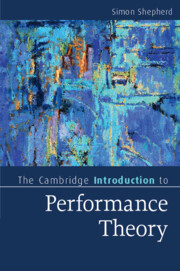Preface
Published online by Cambridge University Press: 05 February 2016
Summary
By the late 1970s the French and the Germans had taken a new word into their languages. This word was necessary because it enabled them to specify an activity for which there was otherwise no available term. The new word that entered their languages was the English word ‘performance’.
The activity to which it was applied consisted of circumstances in which one or more people communicated in real time and shared space with another group of people. The method of communication did not explicitly refer to, and often made a point of rejecting, the conventions of what could be recognised as ‘theatre’. It was a communicative activity seen to take place much more widely and variously than the practice of theatre. Indeed, although never before systematically recognised as such, it was identified as a regular occurrence in general human behaviour, capable of being done by most human beings in whatever society.
This insight came out of a widespread interest in analysing and explaining behaviour that had hitherto been assumed to be simply everyday, normal, natural. It gathered pace, across various disciplines, from the mid-1950s onwards. The first part of the book thus tracks the differing theories and definitions of human interactional behaviour which, beginning in different places, when taken together bring into being a concept of something which is called ‘performance’.
By 1979 ‘performance’ seemed to have gained so much currency, to have spread so far, that it was, some thought, a catch-all term, used to describe almost anything. Over a period of about twenty-five years, then, a concept comes into being, is felt to have such potency that it moves across academic disciplines and arts practices and gets formalised into degree programmes. That coming into being in part resulted from the work of scholars studying the world around them, but a lot of the potency that is attached to the concept of performance was put in place outside the academy, in the work of political activists and artists. A new concept of performance was formed in a new practice of performance, a practice shaped by its interactions with, its battles against the limitations of, the specific presiding economic and social structures, the institutions and violent hierarchies of capitalism, in post-1945 western Europe and the United States, and going on still.
- Type
- Chapter
- Information
- The Cambridge Introduction to Performance Theory , pp. vii - xPublisher: Cambridge University PressPrint publication year: 2016



